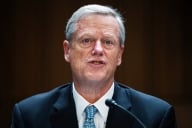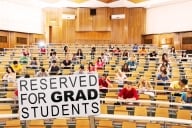You have /5 articles left.
Sign up for a free account or log in.
The Charles Koch Foundation is asking for too much, according to some faculty members at Whitman College.
After the foundation funded a speech at the liberal arts college in Washington State, some faculty members said that, based on the experience, they asked the college to pledge not to seek additional funds from Koch. The foundation, funded by one of the Koch brothers, known for their support for conservative causes, has been criticized by faculty members at other universities for grant requirements that they believe impose too much. At Whitman, the concern is over access to students' e-mail addresses.
The “Classical Liberalism Lecture Series,” funded by Koch, brought Gary Liebcap, a professor of economics at the University of California at Santa Barbara, to campus last month to give a lecture on “The Tragedy of the Commons Revisited.”
Faculty members started to get worried when they heard that the foundation, as part of its grant, asked for the e-mail addresses of students who attended the lecture. Faculty members objected to the idea that a funder was entitled to know which students attended and to get private information, such as their e-mail addresses. Ruth Wardwell, a college spokeswoman (to whom faculty members also referred inquiries), confirmed that the foundation asked for the students' e-mail addresses, but said that Whitman didn't provide them. She also said that the college hasn't decided whether to honor the request of faculty members not to seek additional Koch money.
According to a statement from the Koch Foundation, the request was designed to help students. "In addition to sponsoring speakers series, the foundation provides resources to expand students’ educational opportunities and career development. This includes connecting them with more information about conferences, events and seminars where they can pursue their area of study, in addition to internship and employment opportunities to help them start a career after graduation, which is particularly important with high unemployment in an economically challenging time," said Tonya Mullins, director of communications for the foundation.
Via e-mail, Wardwell said that "we take our responsibility to protect student privacy seriously.... Whitman’s procedure and practice is to not provide student email addresses to external agencies.”
Wardwell declined to discuss the size of the Koch grant amount, but did say the funding did not cover the entire lecture cost.
George Bridges, president of Whitman, said in a statement that providing student e-mail addresses to an outside entity is a violation of college procedure. “If a condition of receiving a grant from the Koch Foundation, or any other external granting agency, requires us to violate our own policies and procedures, such as providing student e-mail addresses to an external granting agency, then we would be unable to meet the condition,” he said. “If that means we are not eligible for grants, we will not apply."
Last summer, the Koch Foundation drew scrutiny over its grants to Florida State University and other institutions. Koch grants tend to focus on free market economics -- and critics say that the foundation insists on too much control over the use of its funds, a charge the foundation and its defenders reject.








